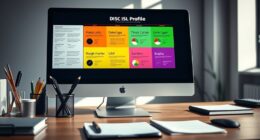Mastering the toughest interview question involves understanding its intent and preparing a thoughtful response. Start by identifying the underlying purpose behind the question, like gauging your self-awareness. Choose a genuine but manageable weakness, avoiding clichés. Pair it with a strength to show balance, and use real-life examples to highlight your growth. Also, practice your communication skills. Maintain eye contact and use clear language to convey confidence. Finally, reflect on your transformation and lessons learned to leave a positive impression. You'll find more strategies that can boost your confidence and performance during tough interviews.
Key Takeaways
- Identify and understand the intent behind tough interview questions to tailor your responses effectively.
- Choose a genuine yet manageable weakness that showcases your self-awareness and growth potential.
- Pair weaknesses with strengths, providing specific examples of how you've transformed challenges into opportunities for development.
- Rehearse answers to common tough questions, ensuring clarity and confidence during the interview.
- Communicate effectively with active listening and concise language, enhancing engagement and demonstrating emotional intelligence.
Understanding Interview Question Intent

Understanding interview question intent is essential for anyone preparing for a job interview. Each question you encounter serves a purpose, helping employers gauge your compatibility with the role and the company culture.
For instance, when they ask about your weaknesses, they're not just fishing for flaws; they want to see if you're self-aware and capable of growth. This can reveal how you handle stress and unexpected challenges, which are vital in any role.
Preparing Your Response

Crafting a well-thought-out response to interview questions is essential for making a strong impression. Start by researching the company and aligning your answers with its values. You want to showcase your strengths while addressing any potential weaknesses.
Consider these key points when preparing your response:
- Personalize your answer: Tailor your response to reflect the specific role and company culture.
- Use real examples: Share anecdotes that illustrate your skills and experiences effectively.
- Practice makes perfect: Rehearse your responses to guarantee clarity and confidence during the interview.
Choosing the Right Weakness

Selecting the right weakness to discuss in an interview can greatly impact your overall impression. Focus on a weakness that's genuine but manageable, showing your self-awareness and commitment to growth.
Avoid clichés like "I work too hard" and choose something more specific, such as difficulty with delegation or public speaking. Share a brief anecdote that illustrates this weakness, emphasizing what you learned and how you've improved.
This not only demonstrates honesty but also highlights your ability to overcome challenges. Remember, the goal is to show you're actively working on your weaknesses and turning them into opportunities for development.
This approach leaves a positive impression, indicating you're reflective and dedicated to personal growth.
Balancing Weaknesses and Strengths

Balance is key when discussing weaknesses and strengths in an interview. You want to present a well-rounded view that showcases your self-awareness and growth mindset.
Here's how to achieve that balance:
- Pair weaknesses with strengths: For every weakness you mention, provide a corresponding strength that demonstrates your ability to improve.
- Use specific examples: Share anecdotes that highlight both your weaknesses and how you've turned them into strengths.
- Focus on growth: Emphasize what you've learned from your weaknesses and how they've positively influenced your professional development. Recognizing emotional intelligence can also enhance your self-awareness during these discussions.
Communicating Effectively

Effectively communicating during an interview can make all the difference in how your weaknesses and strengths are perceived.
Maintain eye contact to show confidence and engage with the interviewer. Use clear and concise language, avoiding filler words that can distract from your message.
When answering questions, listen actively and ascertain you understand what's being asked, asking for clarification if needed. Your responses should be focused and relevant, reflecting your skills and experiences.
Remember to take a moment to gather your thoughts before answering complex questions. This approach not only demonstrates your competence but also your ability to handle pressure, ultimately leaving a positive impression on your interviewer.
Communicating well is a key skill that employers value highly. Additionally, mastering the art of open and honest communication can significantly enhance your ability to connect with others, both in interviews and beyond.
Handling Tough Questions

Maneuvering tough questions during an interview can feel intimidating, but it's a critical skill that showcases your resilience.
When faced with challenging queries, focus on staying calm and collected. Here are some strategies to help you tackle them effectively:
- Acknowledge your weaknesses honestly, but frame them positively.
- Provide specific examples of growth from past failures or challenges.
- Stay relevant by connecting your answers to the role's requirements.
- Understanding how to establish clear boundaries can help you navigate difficult discussions with confidence.
Post-Interview Follow-Up

After maneuvering tough questions during your interview, the next step is to guarantee you leave a lasting impression through effective post-interview follow-up.
Start by sending a thank-you email within 24 hours. Express gratitude for the opportunity and briefly mention something specific from your conversation to reinforce your interest. This indicates you were engaged and highlights your attention to detail.
If you don't hear back within a week, it's perfectly fine to follow up with a polite inquiry about your application status. This illustrates your continued interest in the position.
Finally, stay connected with company contacts and keep researching industry trends. This proactive approach not only reinforces your enthusiasm but also keeps you informed for future opportunities.
Frequently Asked Questions
What Is the Best Way to Practice for Interviews?
To practice for interviews, start by researching the company and role thoroughly.
Prepare responses to common questions, and practice with a friend or in front of a mirror.
Record yourself to assess your body language and tone.
Use specific examples from your experiences to illustrate your skills.
Finally, simulate real interview conditions by timing your responses and dressing appropriately, so you feel confident when the actual interview arrives.
How Can I Research a Company Effectively?
To research a company effectively, start by visiting its official website to understand its mission, values, and culture.
Check recent news articles and press releases to stay updated on their latest developments.
Explore employee reviews on platforms like Glassdoor for insights into workplace culture.
Additionally, follow the company on social media to get a sense of its public engagement.
This thorough approach will help you prepare tailored questions and responses for your interview.
What Should I Wear to an Interview?
What impression do you want to leave as you walk into that interview? Dressing appropriately is essential.
Aim for professional attire that aligns with the company culture—think business formal for corporate settings or smart casual for creative environments. Choose clean, well-fitted clothes, and don't forget about grooming.
Accessories should be minimal. A polished look conveys confidence and respect for the opportunity, making you stand out in a positive way right from the start.
How Long Should My Answers Be During an Interview?
During an interview, your answers should typically be concise, lasting about 1 to 2 minutes. This length gives you enough time to provide relevant details without overwhelming the interviewer.
Focus on clarity and substance, ensuring you address the question directly. Keep it engaging by sharing specific examples that highlight your skills and experiences.
What Follow-Up Questions Can I Ask the Interviewer?
Did you know that 70% of employers appreciate candidates who ask insightful questions?
When following up with the interviewer, consider asking about the company culture, team dynamics, or growth opportunities. You might inquire about the biggest challenges the team currently faces or how success is measured in the role.
These questions not only show your interest but also help you determine if the position aligns with your career goals.
Conclusion
In the grand theater of job interviews, tackling the "greatest weakness" question can be your shining moment. By preparing thoughtfully, you can transform a potential pitfall into a platform for showcasing your growth. Remember, every weakness is just a stepping stone to strength. So, when you step into that interview room, embrace the challenge with confidence, and let your authenticity shine through. You've got this, and soon, you'll be taking center stage in your dream job!
Eugene brings a fresh, dynamic voice to our platform as one of our talented Writers. Specializing in research-driven content, he explores the latest findings in psychology and personal growth, translating them into actionable insights for our readers. Eugene’s work is fueled by a curiosity about what makes us tick and a desire to help others unlock their potential.










